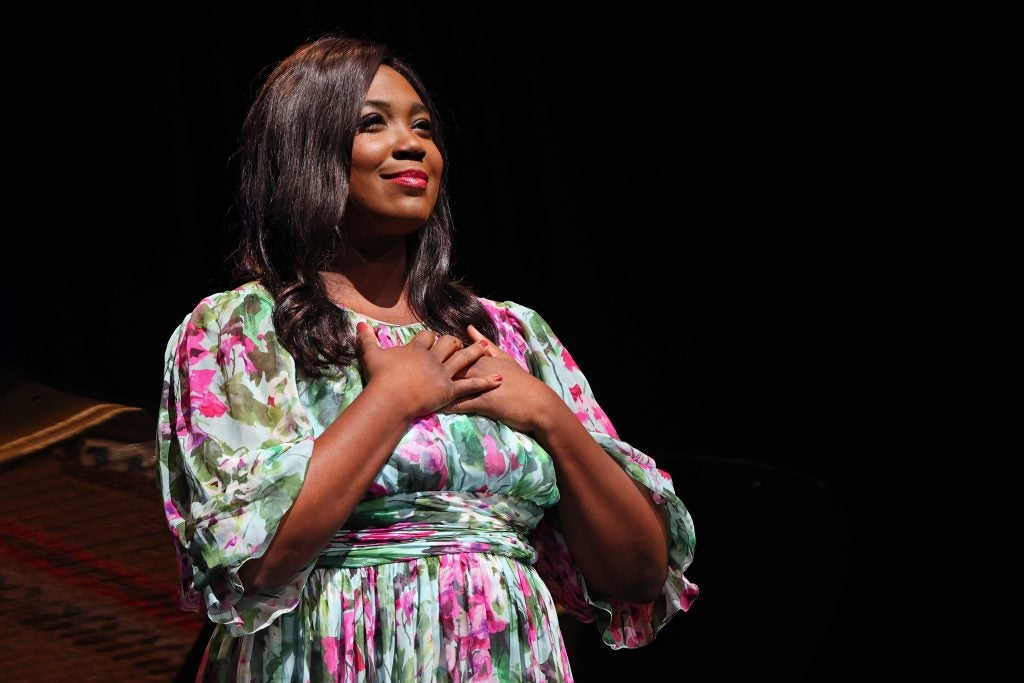Angel Blue’s Homecoming
Angel Blue hadn’t performed in Los Angeles for 15 years. A southern California native and alumna of The UCLA Herb Alpert School of Music graduate vocal program, Blue has spent the intervening time headlining opera’s biggest stages. In November 2022, she returned home. Her first stop was singing Tosca with the Los Angeles Opera. Her next: performing the inaugural Judith L. Smith voice recital at Schoenberg Hall.
It was an emotional evening for the opera superstar.
“The last time I was on stage here, my dad Sylvester Blue – the wonderful Sylvester Blue, the reason I sing, the reason I know anything about opera – was sitting over there, watching me sing [Puccini’s opera] Suor Angelica,” Blue recounted for a near-capacity crowd at Schoenberg Hall. “So, tonight means more to me than I could ever express in words, or even sing in a recital. I appreciate you all for being here, thank you all for taking the time to share this, if I may, homecoming with me.”
She then dedicated the next two songs, Richard Strauss’s “Morgen!” and “Cäcilie,” to her father. With that, she brought the house down.
Angel Blue’s recital was one part of her UCLA homecoming. On November 22, she conducted a public masterclass featuring three members of the vocal program at UCLA: Sabrina Langlois and Abigail Hernandez, both second-year master’s students, and Krystal Mao, a second-year undergraduate. Blue opened by assuring the students that she wasn’t there to break them down or to embarrass them, or even be their voice teacher. “My job is to be your cheerleader, and to bring you up,” she said.
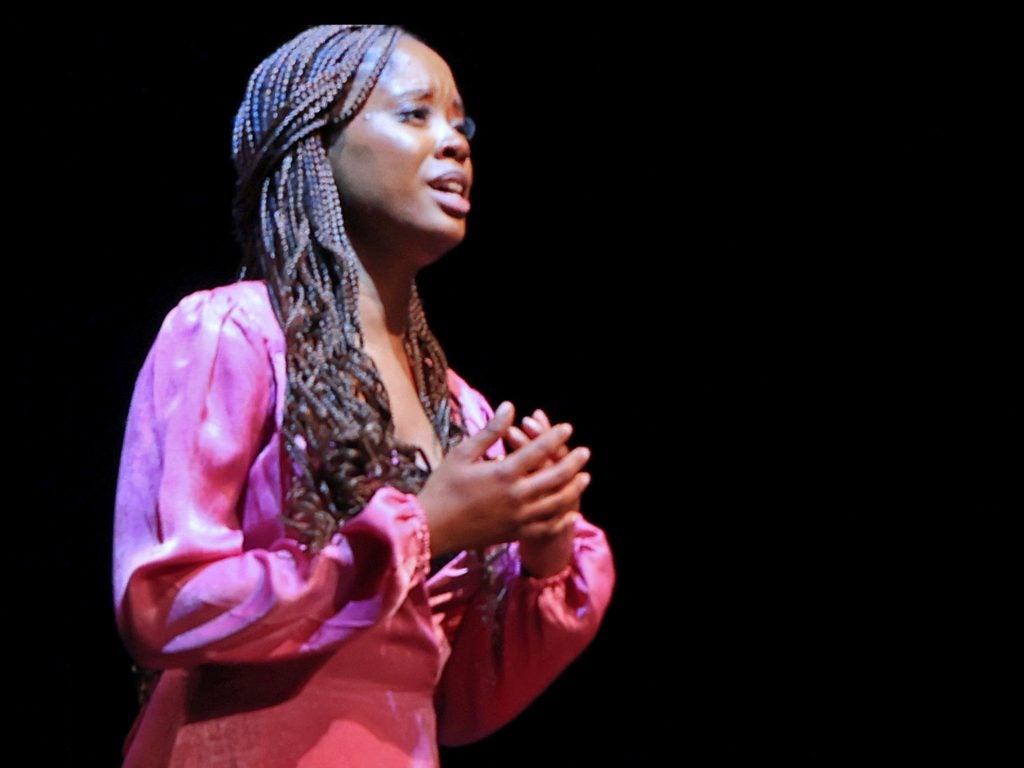
Sabrina Langlois
I came to UCLA to study with Peter Kazaras. Peter pushes you as a student, and he pushes you into a space where you feel free, and that liberates you, as an artist. It was the same thing that Angel Blue told me on stage during the masterclass… To sing for her on stage was very reassuring, because she helped create a safe space for me to grow as an artist. It’s a memory that will stay with me for the rest of my life.
After inviting the audience to stand and join in, Blue led everyone through scales and stretches designed to loosen the body and open the voice. She had everyone take a deep breath, and then release it. Then she spoke. “Take a second, feel your body, feel your feet in the floor. What does that feel like?”
It was Blue’s way of creating the safe space necessary for the intensely personal work of the masterclass. She pinpointed little problems in the students’ technique. She gave concrete advice on how to improve. And she urged each student she worked with to trust her own voice, and to phrase with intention and sensitivity. Her style, ever warm, both instructed and empowered.
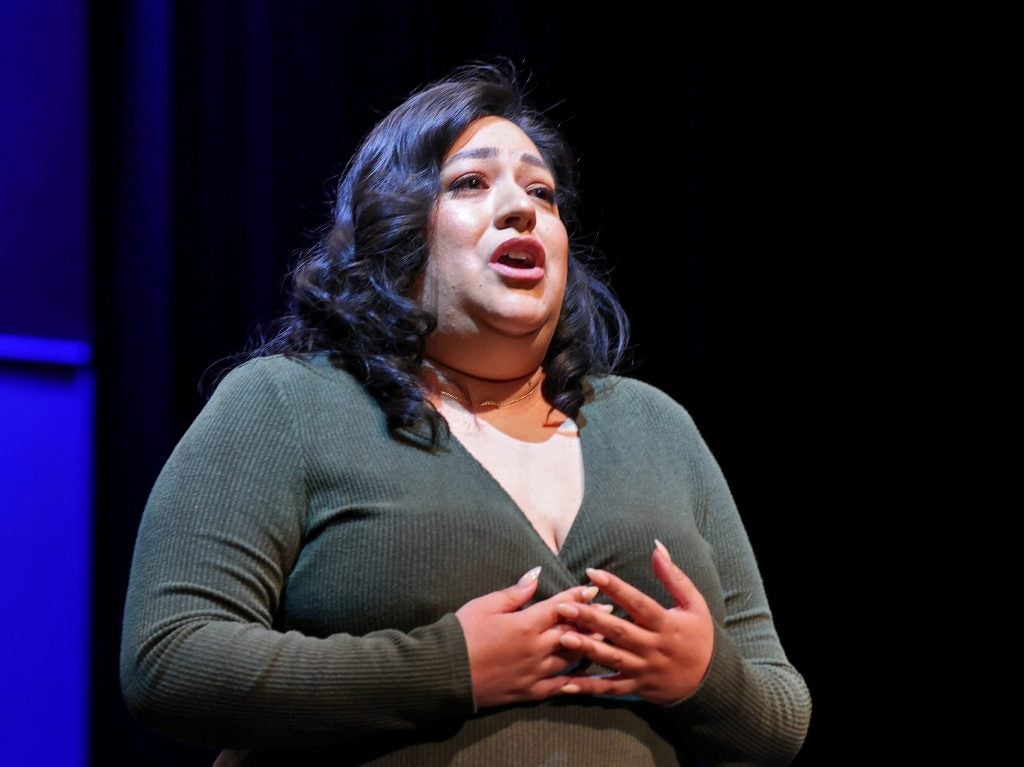
Abigail Hernandez
I knew that UCLA was a great program, but I never thought I would be coached by someone as famous as Angel Blue… I came to [UCLA] to study with Michael Dean and the faculty here, and they’ve been my champions. They are so nurturing, and they make me feel like my dreams can really come true. Hard work is a part of that, of course, but they make me feel like anything is possible.
When the masterclass concluded, Blue welcomed a wide range of questions from the audience. One student asked how she knew she was on the right path, and in the right place. “Just prepare,” Blue told the students. “You are where you need to be.” She then reflected on her own time at UCLA. “I wasn’t always the best student. But if I could go back and tell myself one thing, it would be to do more, to listen to my professors, to attend more concerts.”
Another student asked about the obstacles she had encountered, and how she kept moving forward. “There are always obstacles, there were obstacles last night,” said Blue, referencing her recital at Schoenberg Hall. “I cracked last night at the end of ‘You Can Tell the World,’ she said. It was a disarming admission, and a testament to Blue’s willingness to be honest and to remind her audience that everyone—from the aspiring student to the opera star alike—struggles with adversity.
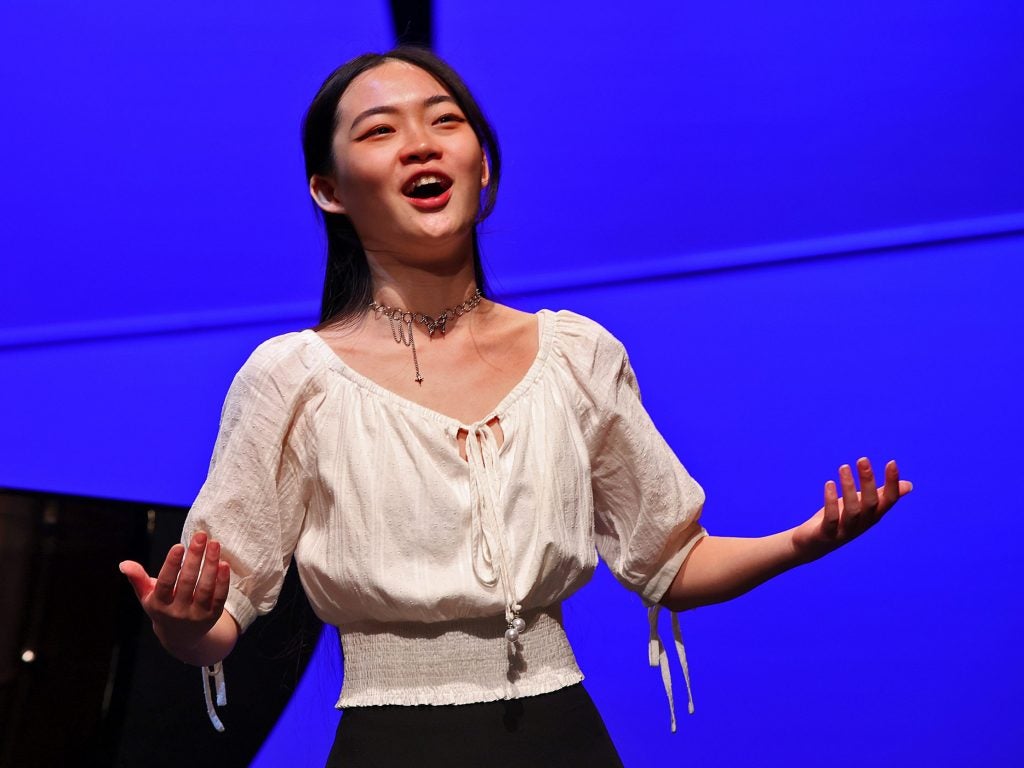
Krystal Mao
I’m very new to the opera scene. When I was applying for college, a video of Angel Blue popped up on my YouTube recommended feed. It was amazing. A couple of months later, Victor Chernov contacted me and said he loved my audition and would like to work with me. Then he asked me if I knew his student Angel Blue. I couldn’t believe it! Now, after two years of working with Victor, my voice has completely transformed. And to be on the stage learning from Angel Blue, that meant everything to me.
The previous night, one might have noted the crack in Angel Blue’s voice. But it had hardly mattered. “Some people have been told, ‘You have a voice, you have to sing,’” said Peter Kazaras, the director of Opera UCLA and the director who guided Blue through that performance of Suor Angelica 16 years ago. “But Angel adores singing. And for that, we are lucky because she gives us a great gift.”
Blue’s gift to the audience began with showcasing her fantastic range of repertoire. Her recital featured everything from Richard Strauss to Kurt Weill to African American spirituals. Her stirring rendition of “Deep River” brought her to recollections of her father. She paused from singing while the piano continued and shared her memories with the audience, tears streaming down her face, before engaging in a triumphal finale in “Ride on King Jesus.” Again, she brought the house down, and the audience to its feet.
For all her power and precision as a world-class singer, Angel Blue has another rare gift: she can still surprise her audience, as was the case when she spoke at the close of her heartfelt performance. Fighting back tears, she said, “I am truly thankful and honored and blessed to UCLA for inviting me to be here.”
Then she squinted into the stage lights, scanning the audience. “I’d like to know if there are any sopranos in the audience, any students?” A murmur went up. “I’d like to invite you up to the stage.” Before long, Blue was surrounded by UCLA students (sopranos mostly, but more than a few mezzo-sopranos had snuck onto stage).
“I didn’t ask Peter or anyone if I could do this,” said Blue. “My encore is [Puccini’s] ‘O mio babbino caro.’ I’ll start, but these ladies will decide among themselves who will continue it.” As the piano began, Blue gestured to the stage and exclaimed “This is the future of opera.”
And then they all sang, inspired by Angel Blue.
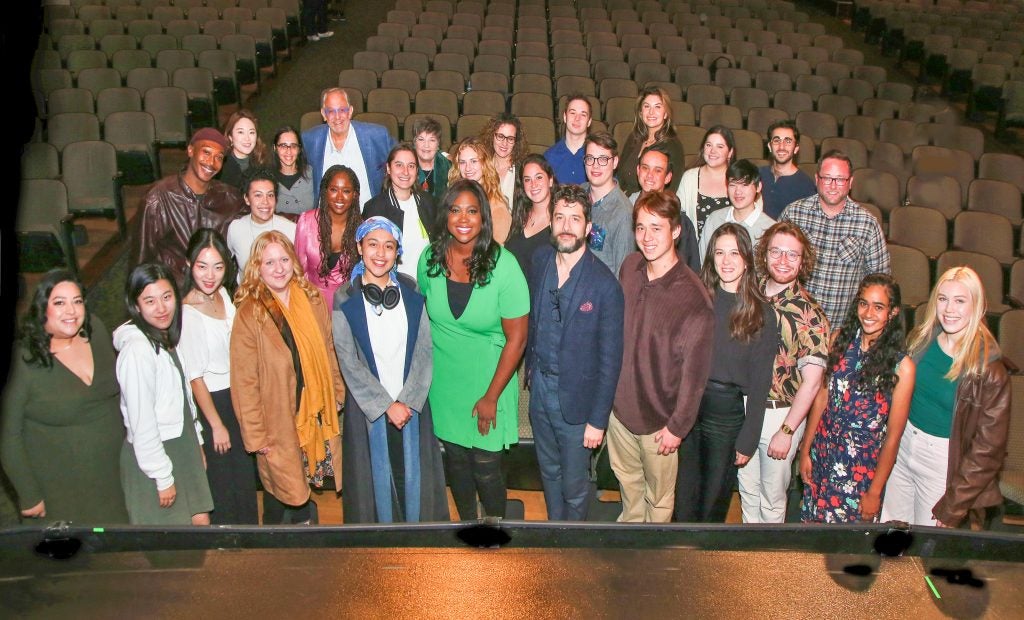
Peter Kazaras Opera Production Fund
Peter Kazaras has made a profound impact on UCLA since his arrival in 2007. He has directed, supervised, or produced 44 productions while instructing and mentoring hundreds of students, including Angel Blue. Give now to help support the nurturing of opera at UCLA.
